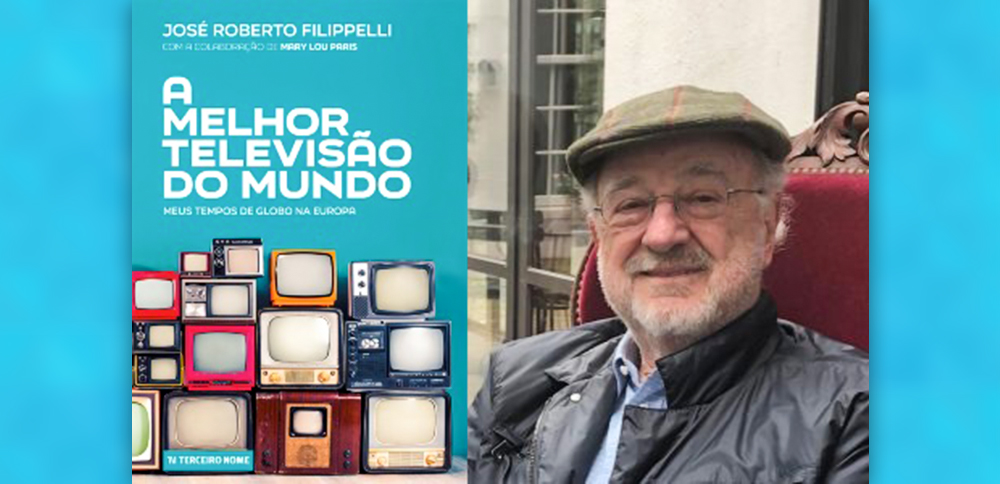From the late 1970s to the mid-1980s José Roberto Filippelli was a household name in the international TV industry. He first made a name for himself in Italy (mostly using his Italian middle name) by selling telenovelas (soap operas) produced in his native Brazil by TV Globo, the country’s largest TV network. At that time Filippelli was the darling of the international TV trade media, mostly for the fact that he invested a lot of money in trade advertising. He branded his own name at TV trade shows such as Monte Carlo and MIP-TV, and eventually in the rest of Europe and beyond, in due course reaching Africa, Asia, and Oceania, where he sold popular telenovelas and other Brazilian-made content.
His wild success lasted until 1999, when he left the TV industry and returned to Brazil where he reclaimed his original first name, “José.”
Filippelli’s adventures in the TV industry started in 1974, and now, at age 84, he decided to recount his beginnings in a new autobiography, A Melhor Televisao Do Mundo (The Best Television in the World). This 212-page volume retails for 53 reals (U.S.$10) and was published by Editora Terceiro Nome, a publishing company in São Paulo that it is owned by his current wife, Mary Lou Paris.
As Filippelli wrote in his book, in 1974, after receiving a good offer to sell the advertising agency he owned with his first (now late) wife, Eunice, he decided, with her and their three daughters, to take a “gap year” in Europe. While in Italy he was captivated by the country’s nascent commercial television industry, and when he returned to Brazil, he approached Globo’s owner, Roberto Pisani Marihno (1904-2003) — a legend in Brazil and throughout the international TV industry, who was simply known as Dr. Roberto — to let him sell his telenovelas internationally outside Latin America, and negotiated a low salary and high sales commissions. Dr. Roberto’s mother was born in Salerno and immigrated to Brazil at a young age. Filippelli’s family also hails from the same region.
So in 1976 the Filippelli family moved to Rome and immediately sold a soap to Italian TV. A Escrava Isaura, a 1976 telenovela, was unlike the U.S. soap operas in that it had a beginning and an ending after over 100 episodes. A Escrava Isaura largely paved the way for Globo’s series to enter several countries, including the Soviet Union and China.
Thanks to Filippelli, Globo’s novelas were sold in over 100 countries around the world, from East Timor to Angola to the U.S. Thereza Quintella, Consul General of Brazil in Los Angeles in 2005, even recalled a story from Portugal, when a Parliament session was interrupted so that legislators could watch the final episode of Gabriela, a 1970s Globo TV novela starring Sônia Braga. “This is the woman who stopped Parliament,” she said.
But it was with Você Decide, an interactive TV show where viewers would decide the ending, that Globo’s programming would enter prime time on TV screens around the world. As much as the telenovelas were successful, they only had secondary TV slots in Europe. Você Decide was also a precursor in format sales, since Filippelli licensed the IP internationally.
Filippelli sold Globo’s programs so well that, after a few years, the Marinho’s found it necessary to renegotiate his contract with a higher base salary and lower commissions.
In his book, Filippelli explains that Globo’s office in Rome occupied a mansion that was more than 2,000 years old, with frescoes on the ceiling.
About the title of the book, Filippelli wrote that “all countries think they make the best television in the world. Less, perhaps, the British, who, in their eternal self-righteousness, must find the BBC the worst.”
While in Italy, Filippelli also witnessed Globo’s acquisition of Tele Monte Carlo (TMC, now known as La 7), a small TV network broadcasting to Italy from Monaco. But in 1990, after searching for a partner/buyer, and following several ill-fated transactions, Globo finally sold 40 percent of its TMC stock to the Italian Ferruzzi Group. Then, in 1993, it sold another 20 percent of its remaining stock to Ferruzzi. Globo lingered as a minority partner until its final exit in 1994.
The interest in TMC was fueled by the large sales of Globo’s programs to private Italian TV stations and the fact the Dr. Roberto’s oldest son, Roberto Irineu, wanted to move to Italy (he spoke perfect Italian).
In one of the book’s anecdotes Filippelli recalls that time at MIPCOM when the Globo staff, and Roberto Irineu Marinho, panicked after Dr. Roberto and his wife Dona Lily decided to go for a walk on the Croisette, hand in hand, without telling anyone.
Because of security concerns, the Marinhos never walked by themselves in Brazil. Family members also avoided large crowds. In one instance, when a young Roberto Irineu interned at ABC TV in New York City, friends at the station who wanted him to experience some local folklore took him to the subway (metro) but exited quickly when they saw the Brazilian panicking at the sight of the strange crowd.
In 1985 Filippelli moved Globo’s Sales division to London. From 1997 until his return to his native São Paulo two years later, Filippelli acted as a Globo’s sales agent for a reduced number of territories, explaining in his book that this great period spanned 24 years between Rome and London, 22 of which he spent in the service of Globo.


Leave A Comment